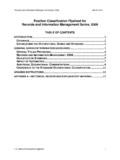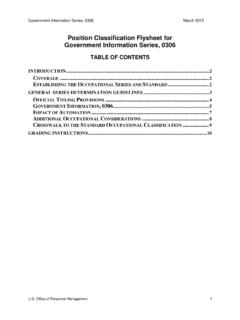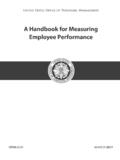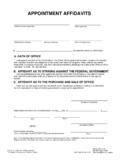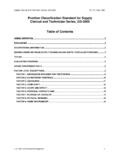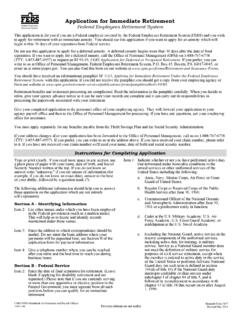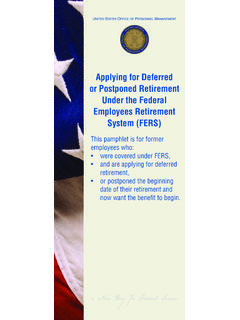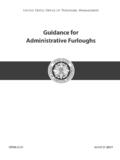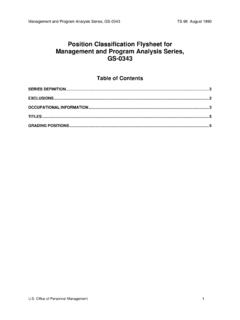Transcription of POSITION CLASSIFICATION STANDARD FOR ... - …
1 Intelligence Series, GS-0132 TS-28 June 1960, TS-27 April 1960 POSITION CLASSIFICATION STANDARD flysheet for Intelligence Series, GS-0132 Table of Contents SERIES DEFINITION OF ORGANIZATION OF INTELLIGENCE THE INTELLIGENCE STRUCTURE OF THE GRADE-DETERMINING INTELLIGENCE RESEARCH SPECIALIST AND INTELLIGENCE OPERATIONS SPECIALIST, INTELLIGENCE RESEARCH SPECIALIST AND INTELLIGENCE OPERATIONS SPECIALIST, INTELLIGENCE RESEARCH SPECIALIST AND INTELLIGENCE OPERATIONS SPECIALIST, INTELLIGENCE RESEARCH SPECIALIST AND INTELLIGENCE OPERATIONS SPECIALIST, INTELLIGENCE RESEARCH SPECIALIST AND INTELLIGENCE OPERATIONS SPECIALIST, INTELLIGENCE RESEARCH SPECIALIST AND INTELLIGENCE OPERATIONS SPECIALIST, INTELLIGENCE RESEARCH SPECIALIST AND INTELLIGENCE OPERATIONS SPECIALIST, Office of Personnel Management 1 Intelligence Series, GS-0132 TS-28 June 1960, TS-27 April 1960 SERIES DEFINITION This series includes positions concerned with advising on, administering, supervising.
2 Or performing work in the collection, analysis, evaluation, interpretation, and dissemination of information on political, economic, social, cultural, physical, geographic, scientific, or military conditions, trends, and forces in foreign and domestic areas that directly or indirectly affect the national security. These positions require a basic knowledge and understanding of one or more of the natural or social sciences, engineering, or military science, but do not demand, as a primary qualification requirement, full knowledge of the current state of the art.
3 COVERAGE The new Intelligence Series, GS-0132, supersedes and combines the former Intelligence Research Series, GS-0132 and the Military Intelligence Research Series, GS-0133; the Military Intelligence Analysis Series, GS-0134, has been redefined and retitled as Intelligence Aid and Clerk Series. The following types of positions are excluded from the Intelligence Series, GS-0132: 1. Those positions requiring as a primary qualification requirement full professional knowledge of the current state of the art in one or more of the natural or social sciences, or engineering.
4 Such positions will be classified to the appropriate series such as Physics Series, GS-1310; Economist Series, GS-0110; Electronics Engineer Series, GS-0855; or Operations Research Series, GS-1515. 2. Those positions concerned with intelligence investigations and security administration measures. (See the Security Administration Series, GS-0080; Guard Series, GS-0085; or the General Investigation Series, GS-1810.) 3. Those positions performing subordinate or clerical work in connection with intelligence data which requires a knowledge and understanding of the administrative or clerical procedures and operations peculiar to the collection, production, and dissemination of intelligence information.
5 (See the Intelligence Aid and Clerk Series, GS-0134.) Included in this series are positions concerned with (a) collection of covert information for intelligence purposes, (b) counter-intelligence, and (c) photo-interpretation when such positions primarily require the application of intelligence techniques and knowledges described in this STANDARD . For example, in the field of photo-interpretation: (1) Positions concerned with using technical skills involved in designing equipment, taking photographs and other images, and determining, by utilizing technical skills and a knowledge of photography, the physical characteristics of the terrain, buildings, and equipment photographed are excluded from the Intelligence Series, GS-0132.
6 Office of Personnel Management 2 Intelligence Series, GS-0132 TS-28 June 1960, TS-27 April 1960 (2) Positions utilizing primarily engineering skills to ascertain the operational characteristics of equipment or structural characteristics of buildings from their photographs are excluded from the Intelligence Series, GS-0132. (3) Positions whose incumbents work with photographic or other graphic data in testing their authenticity and reliability for intelligence purposes, or in interpreting their significance in terms of intelligence objectives are included in the Intelligence Series, GS-0132.
7 (4) Positions whose incumbents plan intelligence collection systems for photographic data, prepare intelligence collection manuals, or fill requests for intelligence requirements in photographic form are included in the Intelligence Series, GS-0132. The grade level descriptions in this STANDARD are necessarily non-specific. They are keyed to operations and programs unique to intelligence functions. Therefore, these grade level descriptions are not to be used for cross-series comparisons. DEFINITION OF TERMS The following terms have specialized meanings as applied to intelligence work and used in these standards : Raw intelligence means data which are unevaluated or unanalyzed from an intelligence standpoint and which may be derived from a variety of sources.
8 Finished intelligence means the product resulting from the collection, evaluation, analysis, integration, and interpretation of all available information which concerns one or more aspects of conditions in foreign nations or in functional areas such as power, transportation, etc., and which is immediately or potentially significant to planning. It may be in written, graphic, or oral form. When the two terms described above are applied to the work of a specific intelligence activity, it will be seen that the finished intelligence product of one activity can become raw intelligence for another activity with a different mission.
9 These terms are used in this STANDARD in the context of the work of the intelligence activity under consideration. Finished intelligence falls into three functional categories: Basic descriptive intelligence, current-reportorial intelligence, and speculative-estimative intelligence. Basic-descriptive intelligence is often of an encyclopedic detailed nature and usually embodies information of a long-term background nature. It may be a survey of a country which includes its geographical, economic, military, and political situation, or it may be a survey of, for example, the world's clay resources and their rate of use.
10 Office of Personnel Management 3 Intelligence Series, GS-0132 TS-28 June 1960, TS-27 April 1960 Current-reportorial intelligence is contemporary information on the up-to-the-minute situation in a foreign country or area. It may, for example, cover the implications of a recent election, revolution, coup d'etat. Its purpose is to keep policy and decision makers currently informed. Speculative-estimative intelligence focuses primarily on projecting what future conditions will be. For example, what will be the effect on the policy of her surrounding neighbors if a certain nation builds up her defensive armament?
